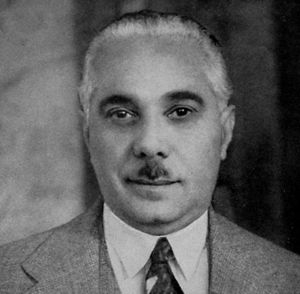Rafael Leónidas Trujillo Molina (San Cristóbal, 24 October 1891-Santo Domingo, May 30, 1961), known as "El Jefe 'or "El Benefactor', 1 was a military and a Dominican politician, who ruled as dictator of the Dominican Republic from 1930 until his assassination in 1961.2 served as Generalissimo of the army between periods as 1930-1938 and 1942-1952 and ruled indirectly during the period 1938-1942 and 1952-1961 using the Presidents titeres.3 4
Its 31 years of Government are known as the Era of Trujillo, 5 and considered as one of the tiranias6 most bloody American Latina.7 his Government was characterized by anti-communism, 8 the repression of all oposicion9 and the cult of the personalidad.10 civil liberties were non-existent and constant violations of human rights were committed.
It plunged the country into a State of panic and «respect», 12 where a death could be disguised as an 'accident' and anyone accused as disaffected could be imprisoned and tortured in one of the clandestine prisons intended for that practica.13
However, supporters of Trujillo include some positive aspects of the regime as the end of the warlordism as a source of political instability, the restoration of public order and a certain economic development of the pais.14 15 during his regime, all levels of the State operated accordingly to interests and established a business monopoly which allowed him to accumulate a large fortune personal.16
The Government of Trujillo was responsible for the deaths of more than 50 000 people, 17 including the thousands killed in the infamous massacre of the parsley. The estimated totals on the number of dead in the massacre range from 5000 up to 25 000. Robert Crassweller mentions these estimates and says that "a figure between 15 000 and 20 000 would be reasonable, although it would remain a conjecture".
As product emerged from the National Guard, 20 created by Americans during the first occupation of the country in 1916, Trujillo paid special attention to the Armadas.21 forces military personnel received generous pay and benefits under his Government, the army expanded numerically and equipment inventories increased. Trujillo maintained control of the officer corps through fear, cronyism and the frequent "rotation of tasks". [citation needed]
The Trujillo regime evolved into a fertile time for the dictatorial regimes in Latin America, being contemporary with other similar Governments in the Caribbean basin, although some authors say, his dictatorship was characterized by being more brazen, brutal and efficient than the others to their alrededor.7 at the same time, Trujillo had against several foreign Governments opposed to the dictatorship , including Rómulo Betancourt de Venezuela, Juan José Arévalo de Guatemala, Cuba's Ramón Grau San Martín, Elie Lescot in Haiti, and José Figueres Ferrer of Costa Rica.
Authors get paid when people like you upvote their post.
If you enjoyed what you read here, create your account today and start earning FREE STEEM!
If you enjoyed what you read here, create your account today and start earning FREE STEEM!